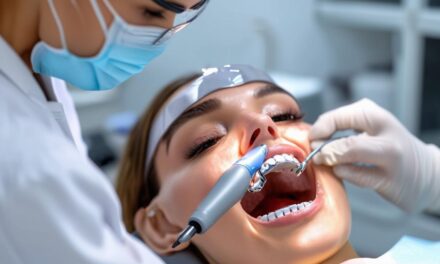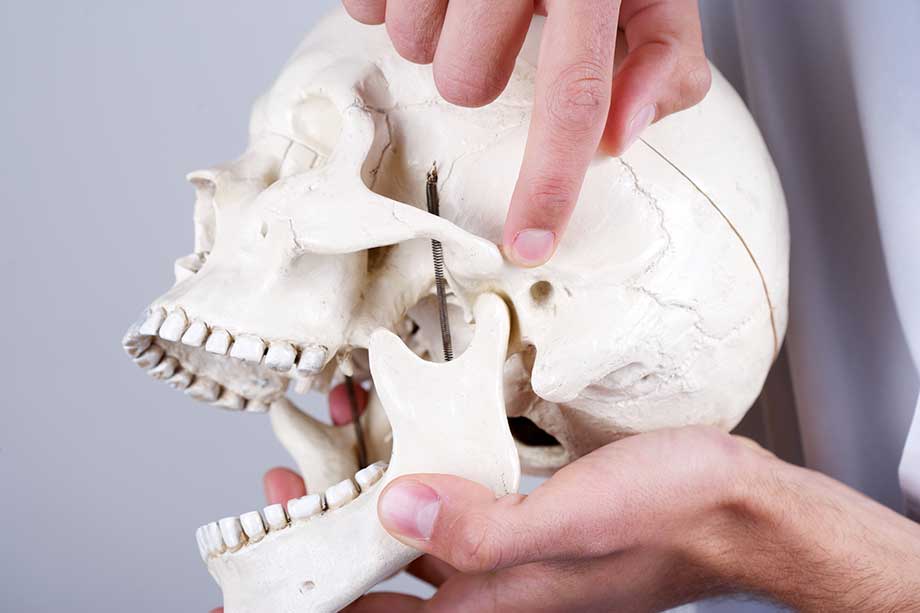A few years ago, The New York Times’ Paul Sullivan told the story of a New Yorker in her early 30s who had ground her teeth for years while sleeping. Over time a number of jaw problems emerged.
Her jaw began to click when she opened and closed her mouth. So, she tried jaw surgery, but to no avail. Eventually, she developed pain in her jaw. A subsequent surgical procedure gave her nerve damage, and she lost several teeth. By the time she went in for a third surgery, she’d stopped chewing on one side of her mouth, she’d developed a lisp, and she had trouble breathing.
“Emotionally, I was really down,” she told Sullivan. “I felt like I shouldn’t have gotten any surgery. I would have rather have lived with joint pain than go through all the pain and bills. It changed my look.”
Think about what she’s telling Sullivan at that moment.
She’s saying that a lifetime of jaw pain would have been better than the emotional, physical and financial price she paid for a surgically misaligned jaw. And this is from someone who endured her condition for only a few years.
For people who endure decades of severe jaw misalignment, those emotional costs, in particular, can feel incalculable. When people feel self-conscious about some structural aspect of their face — the position of their chin, the shape of their nose, their side profile — that feeling seeps into every social interaction and erodes the confidence they build up elsewhere in their lives. In some cases, patients can experience symptoms of depression.
If you recognize those feelings, feelings that tell your self-confidence is on a path in which you constantly take one step forward then one step back, realize you are not alone, and there are options available to you.
And if you have a child or a loved one struggling with those feelings, read on to understand what it’s like to be in their shoes — and how you might be able to help.
Why Most People Judge the Looks of Others
We tend to read a lot into people’s faces and judge people via those facial assessments. And though it’s not fair, we as a species “tend to overvalue appearance,” Marty Nemko, Ph.D. writes at Psychology Today, and favors people whose faces are in line with our standards of beauty.
This has several social consequences, as Nemko points out:
- Adults (parents and caregivers) tend to pay more attention to babies with attractive faces.
- Childhood bullying and cruelty tend to target those with less attractive faces.
- Hiring managers tend to hire and promote people with more attractive faces, and unattractive employees are seen as being less credible.
Interestingly, “attractive” seems to be a moving target, at least somewhat. A team of researchers in Scotland, for example, has found that within the context of heterosexual coupling, women tend to prefer less masculine faces in countries with high levels of national health, as defined according to key World Health Organization statistics. Conversely, as national health decreases, women tend to prefer more masculine faces.
“We found that cross-cultural variation in women’s average masculinity preference was predicted by a NHI derived from eight World Health Organization statistics for mortality rates, life expectancies and the impact of communicable disease,” Lisa M. DeBruine et al write. “Consistent with predictions from sexual selection theory, as national health decreased, women’s average masculinity preference increased.”
Further, people’s facial aesthetic preferences are governed mostly by the environment, not genetics, as Harvard researcher Laura Germine et al write. That means we learn to define some faces as more attractive than others. Twins separated at birth, for example, might have vastly different definitions of human beauty.

Life Can Be Very Different Depending on How Your Attractiveness is Judged
Although attractiveness may be a little dependent on context, the benefits and downsides are clear for everyone whose facial attractiveness is judged.
Raj Persaud, M.D. and Peter Bruggen, M.D. point to a landmark longitudinal study by researchers in Denmark and the US who have followed more than 10,000 Americans who graduated high school in 1957. Over the lifetimes of the people studied, the researchers found that those with especially attractive faces enjoyed “feelings of self-confidence, positive self-regard and agency. The results were consistent with previous studies that found striking people to be more socially at ease, more assertive, and more likely to think they are in control of their own lives.”
On the other hand, people with jaw misalignment issues often have an entirely different set of calculus they must do in social situations. Consider the experience of one poster in the /r/socialanxiety subreddit. This person had an underbite of about 5 to 6 mm, and was planning to get this surgically corrected, but only after some months of wearing braces.
“Now that I have the braces on, I’ve become so much more self-conscious about my bite because the braces make it harder to hide the fact that I have an underbite,” the poster wrote. “I’ve always wanted to take Russian at college purely out of interest, but now I feel way too anxious to speak in front of my classmate[s].”
So, on the one hand, “attractive” people tend to enjoy a self-reinforcing boost of confidence because of how others judge them. On the other, someone who doesn’t feel they meet that definition of attractiveness manages their anxiety to the point that it affects the way they schedule their college classes.
Robert Hoge, a writer and communicator about disability and appearance diversity issues, understands this as well as anyone. Hoge was born with a tumor in the middle of his face, and he spent years coming to terms with his appearance.
“After two dozen operations to ‘fix’ my face, it was obvious it would remain unfinished,” Hoge writes. “My nose was wide and squished. There were dents in the side of my head where my eyes had been before being moved to the front of my face. And I had scars running across my face that looked like train tracks coming into Grand Central Station.”
Hoge often speaks at schools, to children who are still young enough to be candid about their curiosity. And he’s not shy about telling them the truth. In fact, he knows he has to. “When I answer that there have been tough times and fun times, but my looks haven’t defined all of my life and that everyone faces challenges, I get lots of knowing nods. Kids would call me out in an instant if I tried to tell them my appearance hadn’t had a huge impact on my life.”

How Effective is Cosmetic Dentistry at Helping?
In general, the research shows that people with severe jaw alignment issues (and even traumatic injuries to the mouth and jaw) are able to recover their self-confidence after treatment.
There are a couple of caveats, though.
First, most treatments are surgical because that’s what many specialists know best. As Sullivan’s New York Times piece demonstrates, however, surgery isn’t always the best option.
Second, the patient expectations must be in line with what is possible. Cosmetic dentistry cannot help someone with a psychological condition such as body dysmorphic disorder, notes Katharine A. Phillips, M.D., a professor of psychiatry at Brown Medical School. Further, there is a lot of work the patient must do after treatment to rebuild their self-confidence.
With that said, a couple of studies have shown that jaw surgeries have done more for patients than simply improve their self-confidence. In 2008, a trio of researchers from Prince Philip Dental Hospital at the University of Hong Kong Faculty of Dentistry noted “significant changes” in the quality of life of three dozen patients at the six-month mark after orthognathic surgery.
Then in 2018, a team of researchers led by Susan L. Catt at the University of Sussex reported a higher quality of life scores among orthognathic surgery patients at the two-year post-op mark. Interestingly, the upticks in quality-of-life scores were higher among female patients.
Of course, the self-confidence a patient finds after treatment is a function of their satisfaction with treatment, which itself depends on their expectations.
Case in point: A trio of researchers in Brazil also looked into the question of quality-of-life concerns among patients who had undergone jaw surgeries to improve facial aesthetics, jaw function, and psychological well-being. Unfortunately, they write, some of the patients cited in these studies expect too much from their treatments.
“Some patients may have unreal expectations with specific objectives such as professional growth or romantic relationships,” note the researchers, José Augusto Mendes Miguel, Nathália Barbosa Palomares and Daniela Feu.
“These cases are often related to previous frustrating experiences which the individual relates to the presence of his dentofacial deformities. These patients overestimate the influence this treatment has over their lives, which must be identified during the first interview conducted by both orthodontists and dental surgeons in order to prevent a possible misunderstanding between professionals and patients.”
These patients are the exception, however, not the rule. Dr. Jürgen Margraf at Ruhr-Universitaet-Bochum in Germany has found that, among cosmetic surgery patients, only 12 percent describe their expectations with phrases such as “All my problems will be solved” or “I’ll be a completely new person.”
Instead, most express a desire to simply feel better and feel more self-confident.
Building Self-Confidence After a Procedure
Self-confidence and emotional well-being take time to cultivate. A better smile or a stronger chin might create the conditions necessary to cultivate those things, but it’s ultimately up to the patient to follow through.
A reinvigorated quest for emotional well-being, however, has its own peculiar traps. For example, there are clearly healthy levels of self-esteem. Once a person reaches that point, however, pushing further can result in some serious diminishing returns, author Scott Barry Kaufman writes at Scientific American.
“When our goals are to validate our self or to constantly feel good about ourselves, rather than to learn and grow, we actually undermine our learning, relationships, authenticity, ability to self-regulate our behavior, and mental and physical health,” Kaufman says. “It seems that a better alternative, once you have a sufficient belief in your self-worth, is to focus on accomplishing challenging, valued activities and fostering your relationships.”
In fact, self-acceptance — not self-esteem — might be a more worthy pursuit. “Research has shown that self-esteem and self-acceptance are identical predictors of happiness and optimism, but only people high in self-acceptance hold positive views of themselves that aren’t dependent on external validation,” organizational psychologist and author Dr. Tasha Eurich writes.
So that virtuous cycle of “positive regard” and attractiveness that the Danish and American researchers noted might actually just be simple self-acceptance. Unfortunately for people who are too preoccupied with a pain in their jaw, or the sounds they might make while speaking a foreign language before a class, or how their weak chins might hinder their careers, there simply might not be enough mental bandwidth leftover for questions of self-acceptance.
Then again, maybe there is. In 2015, journalist Mary Claire Lagroue wrote a beautiful piece at Verily on her battle with acne scars. After much, much soul-searching, she learned how to accept herself — and the fact that our physical features don’t determine who we are, nor do they determine our self-worth.
“My encounter with skin-based shame led me to realize that self-worth has to first originate from within because that’s where we find our lasting beauty and truest selves,” she writes. “I hope that one day our culture can learn to focus less on superficial features and more on a person’s character—her interior features.
“But in the meantime, those of us who experience perceived ‘imperfections’ on our faces might learn an early life lesson in a more visceral way than most—that beauty is only skin-deep, after all.”
Images by: myroom/©123RF Stock Photo, ferli/©123RF Stock Photo, bowie15/©123RF Stock Photo











